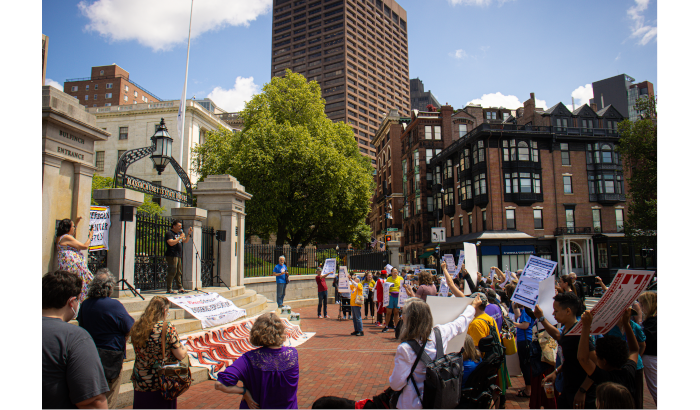Mass climate scientists, advocates say current state carbon emission target is too high to prevent catastrophe
Massachusetts prides itself on leading the nation in environmental and climate reform. Maura Healey made headlines when she created the position of climate chief on her first day as governor, and Massachusetts has been consistently ranked as one of the top two most energy efficient states since 2009, with California as its only serious competition. But concerned residents say there is an area of reform the Commonwealth needs to address with more urgency: reducing its carbon emissions.
Bill S.9, signed by former governor Charlie Baker in 2021, pledges Massachusetts will work toward achieving net zero emissions by the year 2050. But a growing number of activists and climate experts suggest that achieving net zero emissions would not be enough to prevent a climate catastrophe.
The problem with net zero
The process of reaching net zero emissions would entail “cutting greenhouse gas emissions to as close to zero as possible, with any remaining emissions re-absorbed from the atmosphere” by naturally-occurring carbon sinks, such as forests and large bodies of water, like oceans.
“Net zero really means we’re going to have as much carbon dioxide coming in as going out,” said Johanna Neumann, acting director of Environment Massachusetts, an environmental advocacy nonprofit with branches in 30 states. “But the science suggests, globally, that we have to stop burning all fossil fuels by 2050 if we want to avert the worst impacts of climate change.”
Neumann said the net zero target will still allow for harmful fossil fuel emissions to enter the atmosphere, and because of the target, Massachusetts will not feel as much pressure to convert entirely to green energy, an expensive and time-consuming endeavor.
“We think that [this goal is] absurd given just how much clean energy potential Massachusetts has,” Neumann said.
Achieving net zero emissions by 2050 is not a target exclusively set by Massachusetts. In the 2015 Paris Climate Accords, which nearly every country in the world ratified (the United States joined under the Obama administration, withdrew under the Trump administration, and then rejoined on the first day of the Biden administration), it was stipulated that reaching net zero globally by 2050 would keep the Earth’s temperature from rising by 1.5 degrees Celsius to “preserve a livable planet,” according to the United Nations.
Biden pledged a similar effort to reduce the United States’s own emissions to net zero by 2050 with an executive order in December 2021.
Raymond Bradley, a climatologist and director of the Climate System Research Center at the University of Massachusetts, Amherst, explained some of the ways that Massachusetts is currently attempting to reach net zero emissions.
“They’ve taken a number of approaches,” Bradley said. “One is to import renewable energy from different places, such as Quebec and the hydropower that they’re importing. And another is promoting offshore wind.”
Vehicle emissions are a major obstacle
Bradley said these deals are a step in the right direction to lower emissions, but they are not enough to address the Commonwealth’s long term limitation in the transportation sector. He said emissions from vehicles account for roughly a third of Massachusetts’s total emissions, and there is no comprehensive policy in place from the state government about the best way to reduce them.
“We have to remember, they spent $14.6 billion on the Big Dig,” Bradley said. “I feel that money would’ve been better spent putting in a better mass transit system. Nobody in Europe would think about driving around the way we do here—the subways there are usually cheap, frequent and pleasant in most cases.”
Bradley said a huge problem lies in the fact that Massachusetts is a state that “runs east-west,” with no simple way to actually travel from east to west or vice versa, other than the Massachusetts Turnpike. While Baker signed a law in 2022 to ban the sale of all new gasoline-powered cars in Massachusetts by 2035, Bradley said it is simply not enough to bring about the needed changes because of the significant amount of time it would take to make an impact.
100% renewable energy could be the way forward
Instead, Neumann and Bradley advocate that Massachusetts should set a new, more ambitious goal of reaching 100% renewable energy by a set date to make meaningful progress and to divert entirely from fossil fuels. It would certainly cost more, Bradley said, “but even if you fall short, at least you’re heading in the right direction.”
Extinction Rebellion, a group of climate activists who frequently stage non-violent demonstrations and protests across the country, also share these sentiments. Susan Lemont of XR Boston explained the reason why members are often found on the steps of the State House demanding more action from the government.
“I don’t know why people don’t see the urgency, because it’s pretty obvious to me that carbon pollution is killing our planet,” Lemont said. “I would think that not much happens because of the money that fossil fuel companies have given to government officials, certainly on the federal level but also the state level.”
Baker and Healey have garnered criticism from opponents in the past for supporting a gas tax holiday and accepting donations from utility companies, respectively.
But while both had pledged to make progress on the climate crisis, it certainly is not the urgent leaps and bounds that XR Boston is searching for. The group demands halting the use of fossil fuels altogether and to achieve net zero emissions by 2025, not 2050. Lemont said it is because the climate is “collapsing.”
“It’s imperative that Massachusetts makes big steps now. I think it’s going to be dicey if we don’t achieve net zero by at least 2030,” Lemont said. “We’re just trying to press the Commonwealth to do that.”
Bradley said these “big steps” can even start small, such as pledging to reach net zero emissions, and then thinking bigger along the way.
“I think the way this works is you start off with something that people think is completely unrealistic, or very ambitious, and then suddenly, it’s not so unrealistic and it’s not quite as ambitious because new technologies come along, new people adapt and adopt things,” Bradley said. “So then, you can begin to say, okay, well, maybe that goal can be improved upon. So it’s a sequential sort of process.”
Environment Massachusetts has pressed for the passage of the 100% Clean Act (H.3689), which Neumann, who is also Environment America’s senior director of the Campaign for 100% Renewable Energy, explained would codify a commitment to switch to renewable energy sources by 2035, along with many other stipulations for the transportation and building sectors to ensure emissions reduction and work towards a greener and environmentally friendly Commonwealth.
“Shifting how we produce energy is a monumental task, and we’re going to have to build the bicycle at the same time we’re riding it. It’s not going to be a process without hiccups. But we know that it’s something that we need to do and the resources are there,” Neumann said. “We just need to get cracking.”
This article was produced for HorizonMass, the independent, student-driven, news outlet of the Boston Institute for Nonprofit Journalism, and is syndicated by BINJ’s MassWire news service.
Taylor Brokesh (she/her) is a HorizonMass reporter. She is also a senior studying journalism at Boston University. Brokesh has covered just about everything, from state government to midterm elections to the World Cup and beyond, and in the future she hopes to cover the environment and politics. When she’s not reporting or editing, you can find her watching movies from the early 2000s, browsing small record stores and bookstores or hunting for the next best bowl of ramen.





